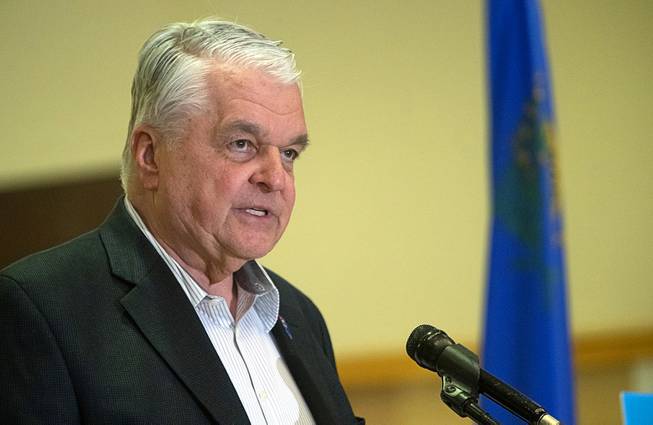
Nevada Gov. Steve Sisolak speaks during a news conference at the Sawyer State Building in Las Vegas,Tuesday, March 17, 2020. Sisolak ordered a monthlong closure of casinos and other non-essential businesses in order to stem the spread of the new coronavirus (COVID-19).
Monday, July 20, 2020 | 7:13 p.m.
CARSON CITY — Nevada Gov. Steve Sisolak on Monday signed five bills passed by the Legislature restoring some of the $536 million in cuts the governor outlined in his proposed budget and creating a federally funded grant program for schools facing coronavirus expenses.
Sisolak signed the bills a day after the conclusion of a marathon 12-day special legislative session.
Memories of the Great Recession and its effect on Nevada lingered as lawmakers worked to plug a projected deficit one-fourth the size of the state’s general fund. With bars closed throughout Nevada, visitor volume down and the number of virus cases on the rise, the state once again faces a severe budget crisis.
Its problems are compounded by its unique tax structure: The state levies no income tax on residents and relies heavily on sales taxes to underwrite its budget, particularly from Las Vegas’ gambling and hospitality industries.
Lawmakers worked off Sisolak's baseline budget proposal and pored line-by-line over proposed cuts to state spending, visibly exasperated by the need to make cuts to Medicaid and education programs to balance the budget.
“Our state was given a terrible diagnosis. And anytime you receive a terrible diagnosis, you want the very best doctor on your side. And even if you have that … you also want a second opinion. And I think that’s the work we did,” state Sen. Julia Ratti, D-Sparks, said.
Throughout the session, lawmakers identified $139 million in additional funding sources not tapped by the governor’s initial proposal. They passed bills to defer major construction projects, draw millions from various departmental reserves, divert $48 million from the state highway fund to the general fund and require mining businesses pre-pay taxes based on estimated annual activity.
Lawmakers restored $49 million for “optional” Medicaid programs that the federal government lets states choose whether to fund, including programs for prosthetics and behavioral health. They restored $41.5 million to reduce the number of annual furlough days the state has asked public employees to take from 12 to 6 and to unfreeze merit-based pay increases, prompting a state workers’ union to drop a lawsuit contesting the changes.
Harry Schiffman, president of Local 4041 of the American Federation of State, County and Municipal Employees, said he was pleased workers would bear less of the brunt of the cuts. He thanked lawmakers “for listening to state workers as we shared how another round of cuts would devastate our families as we all continue to fight this pandemic.”
Republicans — the minority party in both the state Senate and Assembly — rebuked the final plan for prioritizing the restoration of funding for state workers over education.
"This is what happens when a one-party control system creates extreme, hyperpartisan legislation that favors special interest. ... Our Democrat colleagues have chosen to support unions who fill their campaign coffers over Nevada families,” said Minority Leader Robin Titus, R-Wellington, who initially voted against the session's major budget bill.
Titus and other Republicans reversed their votes after Democratic leaders inserted a $50 million block grant program for schools facing unexpected virus-related expenses. With the program, lawmakers attempted to compensate for cuts to programs including Nevada's “Read by Grade 3" initiative. School districts have noted widespread broadband connectivity gaps and students without computers as they prepare to adopt a classroom-remote learning hybrid plan.
To balance its budget, Nevada will supplement cuts with another half-billion dollars in federal relief money, which they’re allowed to allocate to pandemic-related expenditures.
Exempt from Nevada’s open meetings and records laws, the Legislature held much of the special session behind closed doors. When lawmakers convened on the floor, they heard from department heads about their reserve levels and the effects of the cuts. At one point — when frustration over the cuts reached a boiling point — they passed a bipartisan plea for additional federal aid.
Provisions of the budget bill allow the state to restore funding for programs if projections change or Congress passes more federal aid.
